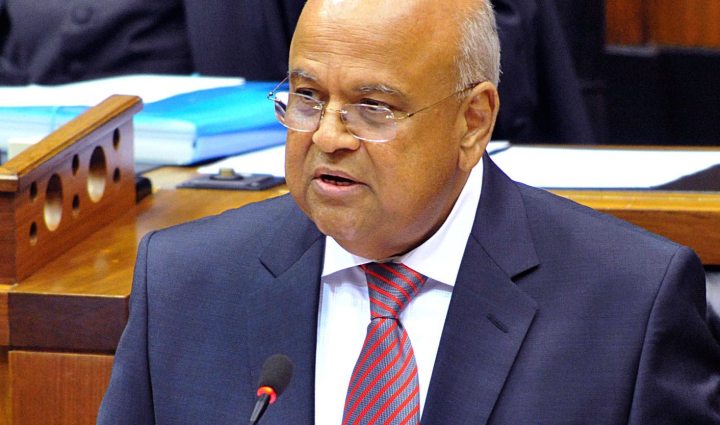South Africa
Budget 2016: No austerity, some tax increases, slash in expenditure, deficit down

South Africans have been spared major pain in the 2016 Budget but Finance Minister Pravin Gordhan has announced tax increases to add R18 billion to revenue. While growth is expected to be just 0.9% this year compared to 1.3% in 2015, Treasury has not opted for dramatic policy changes to raise revenue. Gordhan has announced a cut the expenditure ceiling by R10 billion but there is an increase in spending in higher education, economic infrastructure and social protection – made possible through the Treasury’s new catchphrase: “reprioritisation”. By RANJENI MUNUSAMY and MARIANNE MERTEN.
Pravin Gordhan starts of this year’s Budget speech by saying he has a “simple message”. “We are strong enough, resilient enough and creative enough to manage and overcome our economic challenges”. At a media briefing ahead of the Budget, Gordhan said government aimed to deliver a “credible” Budget in a “very difficult environment”.
The 2016 Budget certainly does reflect “creativity” with “reprioritisation” being the key word to enable funding for South Africa’s crisis and priority issues such as higher education and training, drought relief and the social wage.
The budget deficit will fall from 3.2% in the 2016/2017 year to 2.4% in 2018/2019. Unlike last year, there is no blanket percentage increase in personal income tax but there are adjustments to personal income tax brackets and rebates for inflation. “Taxes are raised moderately, across a broad base, while limiting the impact on lower-income families,” Gordhan said.
At the pre-Budget media briefing, Gordhan said the Treasury had opted to be “creative” with tax proposals rather than to introduce a wealth tax or increase Value Added Tax (VAT) to raise revenue. There will therefore be an increase of 30 cents a litre in the general fuel levy, a new “tyre levy” introduced from 1 October 2016, an increase in the incandescent globe tax to promote a turn to more energy efficient lighting, an increase of the plastic bag levy from six cents to eight cents and increases to the motor vehicle emissions tax. While sin taxes – alcohol and cigarettes – go up as usual, between 6% and 8.5%, Gordhan has also announced a brand new tax to fight obesity. A tax in sugar-sweetened beverages is aimed at reducing excessive sugar intake.
Gordhan said transfer duties on properties above R10 million would increase from 11% to 13%.
Government still looks to raise revenue by a further R15 billion a year in 2017/2018 and 2018/2019. This might see reconsideration of tax proposals not opted for in this budget. Gordhan said decisions would be made in the next budget cycles about which tax instruments to employ. When asked about the possibility of an increase in VAT, he commented that he viewed this as a “regressive tax”.
Due to slow growth, rising debt and higher interest rates, fiscal consolidation will be accelerated, Gordhan said.
Government aims to cut R10 billion from its expenditure in the 2016/17 financial year, predominately by limiting state salaries, officially known as “compensation”. From 1 April “appointments for non-critical vacant posts will be blocked on government’s payroll system”, says the Budget review document. This is aimed at “unnecessary” administrative and managerial posts identified in revised departmental staffing plans. Teachers, nurses, police officials, and other critical posts, will not be affected by this block. In the pre-Budget briefing, it also emerged cars for public representatives will be capped R750,000, but further details would emerge later.
Treasury has responded to new spending requirements within the reduced expenditure ceiling. An amount of R31.8 billion has been “reprioritised” over the next three years. This includes allocations of R16.3 billion for short-term funding challenges in higher education.
As the drought continues to bite, the operational costs to distribute water may now be offset against the provincial and municipal disaster relief grants, which previously were dedicated to infrastructure and rehabilitation. However, no new funds have been allocated specifically for drought relief efforts.
Instead, the Budget notes the “reprioritisation” of around R1 billion within the 2015/16 financial year. This includes R502 million from the water and sanitation department to drill bore holes and to buy water tankers, R318 million of the agriculture department’s Ilama/Letsema projects is redirected to move cattle to graze on state land and to bring safe drinking water to drought-stricken areas, and R187 million from the rural development department to acquire animal feed.
The Land Bank has set aside money for concessional loan facilities to “assist farmers in recovering from the impact of the current drought conditions”, according to the Budget. However there is some good news in the Budget: the contingency reserves have been pushed up to R6 billion, giving government the flexibility to respond to emergencies and disasters, the drought included.
The Budget will contribute R880 billon to the social wage in 2016/2017. R11.5 billion will provide for inflation-linked adjustments to social grants and growth in the number of beneficiaries. This will allow old age, disability and care dependency grants to rise by R80 in April and a further R10 in October. The child support grant will rise by R20 in April and foster care grant by R30.
There remain risks to the fiscal outlook. Food inflation has increased, and higher electricity tariffs are in the making – thus increasing pressures on consumers and inflation-related expenditure by government. The weaker than expected economic growth remains a risk over the next three years, but as Gordhan has pointed out in his pre-Budget briefing: there are many factors internationally and domestically that could change dynamics at very short notice. Thirdly, the precarious financial health of several state-owned entities remains a risk factor. DM
Photo: Finance Minister Pravin Gordhan delivers his Budget speech at Parliament in Cape Town, Wednesday, 27 February 2013. Picture: GCIS/SAPA

















 Become an Insider
Become an Insider